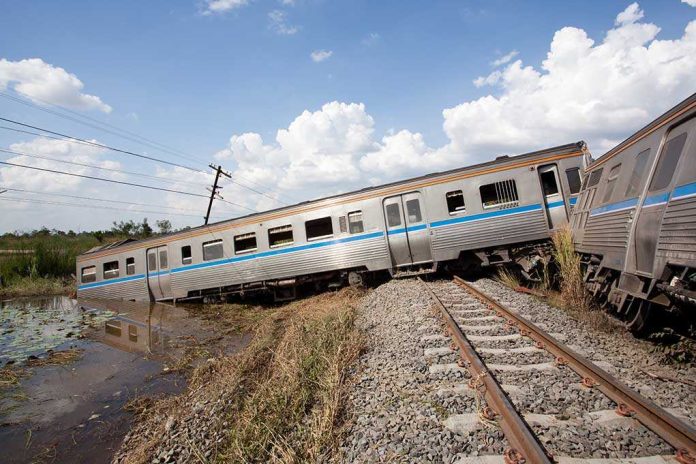
A massive train derailment in rural Texas exposes growing concerns about rail safety, hazardous materials, and the risks facing small-town America amid ongoing national debates about regulation and infrastructure.
Story Snapshot
- Thirty-five Union Pacific freight cars derailed near Gordon, Texas, but no injuries or hazardous leaks were reported.
- The derailment follows a recent wave of high-profile rail accidents across the United States, heightening scrutiny of railway safety standards.
- Emergency responders implemented hazardous materials protocols and contained a grass fire at the scene, but the cause of the derailment remains under investigation.
- Local communities and national policymakers are left questioning whether current oversight is enough to protect public safety and critical infrastructure.
Large-Scale Derailment Raises Safety Alarms in Rural Texas
On August 12, 2025, a Union Pacific freight train carrying 35 cars derailed on a bridge outside Gordon, Texas—a rural community in Palo Pinto County. The derailment occurred around 2:00 p.m. local time, immediately prompting an emergency response. Fire crews arrived quickly, containing a grass fire that broke out adjacent to the site, and hazardous materials (HazMat) teams were deployed as a precaution. Local officials confirmed no injuries, no evacuations, and no evidence of hazardous material leaks, but treated the incident as a HazMat situation to ensure public safety and environmental protection.
The incident’s scale is notable: thirty-five rail cars derailed on a bridge above Coalville Road, just two miles east of the small town. While large-scale train derailments are relatively rare in rural Texas, this event follows a series of national rail accidents that have prompted increased scrutiny of railway safety protocols, especially concerning hazardous materials. Recent years have seen calls for improved infrastructure maintenance, better emergency response plans, and stronger oversight at the federal and state levels.
Emergency Response and HazMat Protocols Reflect Ongoing Rail Safety Debate
Local emergency services and Union Pacific officials coordinated a swift response, securing the area and launching an initial investigation into the cause of the derailment. The bridge location heightened concerns about potential damage to critical infrastructure and the risk of hazardous substances entering the environment. Although no leaks were confirmed, officials maintained HazMat protocols to mitigate any possible threat to residents or the local ecosystem. This approach reflects lessons learned from past incidents, such as the East Palestine, Ohio derailment in 2023, which sparked national debate over hazardous material transport and rail safety standards.
The absence of injuries and immediate environmental harm was a relief for both local residents and public safety officials. However, the incident underscores persistent anxieties about the adequacy of regulatory oversight and preparedness when it comes to transporting hazardous materials through small communities. With investigations ongoing, stakeholders—including the Federal Railroad Administration and local authorities—are pushing for answers about what caused the derailment and whether more can be done to strengthen preventive measures.
Broader Implications for Texas Communities and National Policy
The derailment’s impact extends beyond temporary rail disruptions. For the people of Gordon and surrounding areas, the event serves as a stark reminder of the vulnerabilities rural communities face when it comes to critical infrastructure and hazardous cargo. Local businesses reliant on freight transport may experience delays or disruptions, while residents are left questioning whether enough is being done to protect their safety and property.
Nationally, the event adds fuel to ongoing political debates about rail safety, regulatory authority, and the role of government in safeguarding public interests. Many Americans—especially those who value limited government but expect robust protection of property rights and community well-being—are watching closely to see if policymakers will address gaps in oversight without resorting to overreach. As calls for reform grow louder, the challenge will be finding solutions that enhance safety and accountability while respecting local control and traditional American values.
35 Union Pacific train cars derail near Texas town, no injuries reported https://t.co/aSG7uGhqoH
— Troy Record (@troyrecord) August 13, 2025
Rail industry experts point to the need for sustained investment in infrastructure and advanced monitoring technologies, while some policy advocates demand stricter regulation of hazardous materials. Still, others caution against knee-jerk legislative responses that could burden lawful commerce or undermine economic stability. For now, the Gordon derailment stands as the latest test of America’s commitment to both progress and prudence—a balance that remains at the heart of public trust in government and industry alike.
Sources:
Fox News: Smoke pours from train derailment in Palo Pinto County, Texas
ABC News: Train carrying possible hazardous materials derails in Palo Pinto County, Texas







